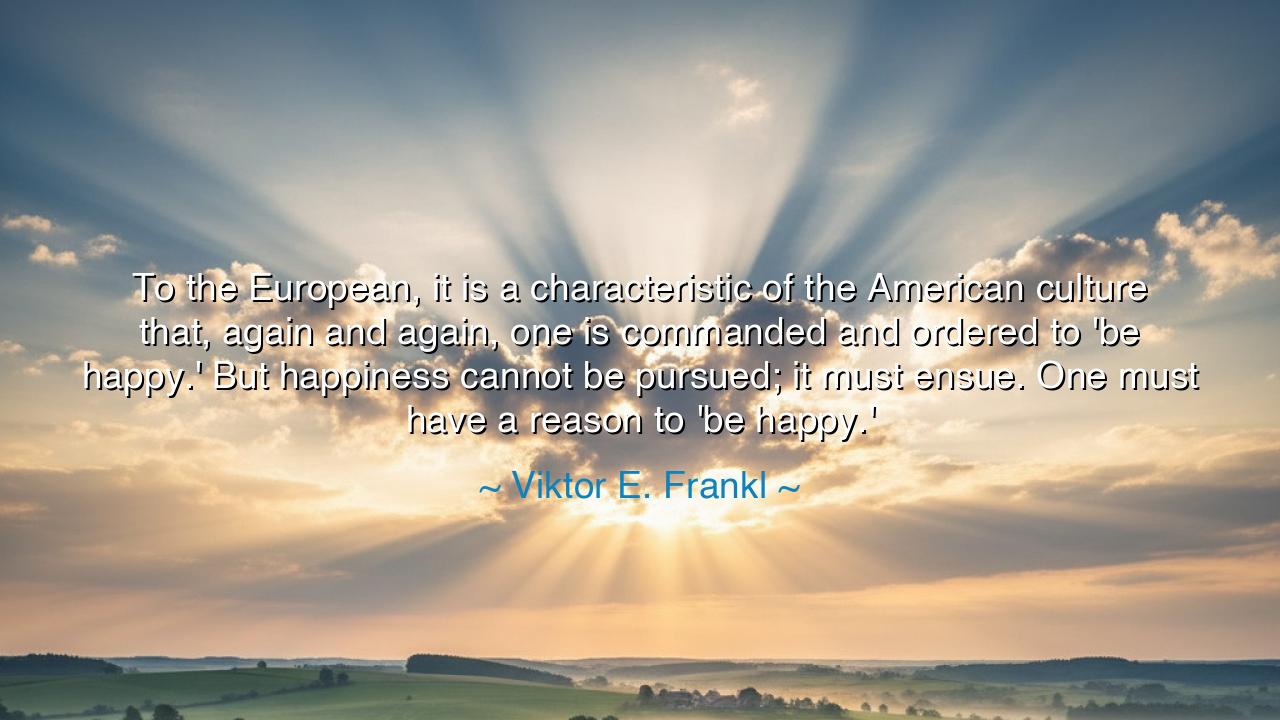
To the European, it is a characteristic of the American culture
To the European, it is a characteristic of the American culture that, again and again, one is commanded and ordered to 'be happy.' But happiness cannot be pursued; it must ensue. One must have a reason to 'be happy.'






The great Viktor E. Frankl, a man who walked through the valley of death in the concentration camps and yet found within that darkness a radiant light of meaning, once declared: “To the European, it is a characteristic of the American culture that, again and again, one is commanded and ordered to ‘be happy.’ But happiness cannot be pursued; it must ensue. One must have a reason to ‘be happy.’” These words carry the gravity of ancient wisdom, for they remind us that joy is not a prize to be seized, but a consequence of living rightly. Like the fragrance that follows the bloom of a flower, happiness ensues only when the soul fulfills its purpose.
In the old world, where Frankl was born, men and women were taught that life’s meaning lay not in pleasure, but in purpose. The storms of war and loss tore through their days, yet those who endured found strength not by chasing delight, but by holding fast to meaning even in suffering. Frankl, imprisoned at Auschwitz, witnessed men starved, beaten, and stripped of dignity. Yet he saw something profound: those who survived longest were not the strongest in body, but those who had a reason to live—a hope, a task, a loved one, a belief. Happiness, for them, was not an order to obey but a gift that emerged from endurance and faith.
Contrast this with the fever of modern times, where the heart is commanded to “be happy” as though happiness were a garment to be worn on demand. Men chase it through riches, fame, and indulgence, yet it slips through their grasp like mist in the morning. This is because happiness cannot be hunted, for it flees from the hunter. It comes unbidden, only when one ceases to demand it and instead gives himself to something greater than his own comfort. As Frankl teaches, to pursue happiness is to misunderstand its nature—it is not the goal of life, but the consequence of living meaningfully.
There is a tale from the time of the Stoics that mirrors this truth. When Emperor Marcus Aurelius lost his beloved son, many expected him to be consumed by grief. Yet he wrote in his Meditations: “Do not seek for things to happen as you wish, but wish for them to happen as they do, and you will find serenity.” The emperor found peace not by resisting fate, but by accepting it and finding purpose within it. His happiness ensued—not from denial of pain, but from the noble acceptance of it. So it is with all who walk the path of wisdom: they do not chase the light, but walk faithfully through the dark, and the light finds them.
In truth, to be happy is not to feel pleasure, but to live meaningfully. The mother who labors for her child, the craftsman who shapes his work with love, the healer who tends to the wounded—none seek happiness as an end, yet they find it as a companion on the road of purpose. For happiness is the shadow cast by a life turned toward meaning, and meaning itself is born of service, love, and responsibility.
Thus, the lesson is this: seek not to be happy, but to be worthy of happiness. Do not ask life to please you; ask instead what you may give to life. When your heart is devoted to a cause, when your actions spring from love and truth, happiness will follow you quietly, like a loyal friend. But chase it directly, and it will vanish into the wilderness of your own desires.
Let every soul remember: Happiness must ensue, not be pursued. Live not as one who demands joy from the world, but as one who gives the world a reason to be joyful. Wake each morning and ask, “For what purpose do I rise?” Then go forth and serve that purpose with courage and sincerity. In time, you shall find that happiness, that elusive spirit, has come to dwell beside you—unbidden, yet deeply deserved.
So, children of tomorrow, take this teaching to heart: make meaning your pursuit, and happiness your companion. Do not obey the hollow command to “be happy,” but instead live so that happiness follows you naturally. For as the ancients have long known, it is not by seeking joy that we are fulfilled—but by seeking truth, purpose, and love, through which joy itself is born.






AAdministratorAdministrator
Welcome, honored guests. Please leave a comment, we will respond soon